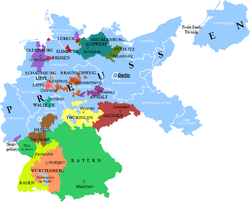This article relies largely or entirely on a single source .(January 2023) |
Landtag elections in the Republic of Baden (Republik Baden) during the Weimar Republic were held on four occasions between 1919 and 1929. Results with regard to the percentage of the vote won and the number of seats allocated to each party are presented in the tables below. [1] [2] On 31 March 1933, the sitting Landtag was dissolved by the Nazi-controlled central government and reconstituted to reflect the distribution of seats in the national Reichstag. The Landtag subsequently was formally abolished as a result of the "Law on the Reconstruction of the Reich" of 30 January 1934 which replaced the German federal system with a unitary state. [3]
Contents
